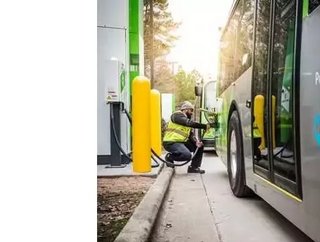Six US utilities launch Electric Highway Coalition

Six major US utilities have announced a plan to ensure EV drivers have access to a seamless network of charging stations connecting major highways in the South, Midwest, Gulf and Central Plains regions.
The Electric Highway Coalition – comprising Duke Energy, American Electric Power, Dominion Energy, Entergy Corporation, Southern Co., and the Tennessee Valley Authority – will enable EV drivers seamless travel across a broad portion of the country through a network of DC fast chargers.
"The path to cleaner transportation is a robust charging infrastructure along the nation's major highways," said Lang Reynolds, director of Electrification Strategy for Duke Energy. "Range anxiety is a barrier to more EV adoption. This coalition can erase those obstacles and help deliver the benefits of EV ownership to consumers."
The companies are each taking steps to provide EV fast charging options within their service territories to facilitate interstate travel. This partnership represents an unprecedented effort to offer EV drivers convenient charging across different company boundaries and allow travel without interruptions.
The Edison Electric Institute estimates 18 million EVs will be on U.S. roads by 2030. While many drivers recognize the benefits of driving an EV, such as the ease of low-cost home charging, some are concerned with the availability of charging stations during long road trips. Coordinated efforts like this are demonstrating that EVs are a smart choice for driving around town as well as traveling long distances.
For Duke Energy, specific fast charging station locations will be determined through the course of existing and planned fast charging program deployments. This effort will provide drivers with effective, efficient, and convenient charging options that enable long-distance electric travel. Sites along major highway routes, with easy highway access and amenities for travelers are being considered first.
Charging stations will provide a high-powered fast charging experience as new EV models released on the market are capable of charging at faster and faster speeds.
Supporting the transition to EVs
Duke Energy has already launched ambitious programs to expand EV charging both internally at company locations and externally through several utility pilot programs. An internal "Electrify By Example" initiative is starting with an effort to install workplace chargers at all work locations to enable employees to drive electric.
In Florida, the company's Park and Plug pilot has installed more than 570 EV public charging stations throughout the state. Fifty of the 570 are fast charging stations connecting areas of Florida previously underserved by EV fast charging infrastructure. To date, drivers have used the Park and Plug network for over 60,000 charging sessions, displacing more than 90,000 gallons of gasoline.
Regulatory action in 2020 led to pilot programs being approved in both North Carolina and South Carolina. The pilots will lead to full fast charging for all types of EVs in about 20-30 minutes.
In North Carolina, a $25 million pilot program will lead to the installation of 200 public Level 2 and fast charging stations, additional stations at multifamily buildings and a school bus electrification pilot that will allow school districts to change out diesel buses with electric ones.
In South Carolina, the company will provide up to a total of $1,000 for 400 residential Duke Energy Carolinas customers who install a Level 2 charging station, provide access to their charging data, and manage EV charging load to occur during off-peak periods. The company will also deploy 60 fast chargers there to expand access to fast charging infrastructure in the state.
Assuming widespread EV adoption, McKinsey projects that commercial and passenger fleets in the US could include as many as eight million EVs by 2030 (compared with fewer than 5,000 in 2018), which would amount to between 10 and 15 percent of all fleet vehicles. Powering those EVs will require huge investment and infrastructure.
It estimates that the country will need some $11 billion of capital investment by 2030 to deploy the 13 million chargers needed for all of its EVs. Fleet EVs alone would consume up to 230TW-hours of power per year, which would be approximately 6 percent of current US power generation. Their batteries would offer roughly 30GW-hours of electricity-storage capacity, or 15 to 20 percent of projected capacity in 2030.






